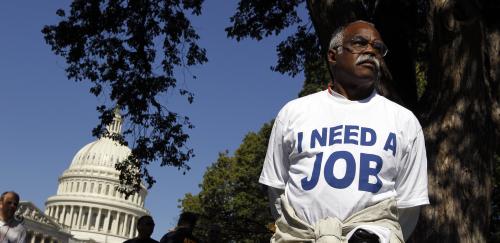Black Americans born poor are much less likely to move up the income ladder than those in other racial groups, especially whites. Why? Many factors are at work, including educational inequalities, neighborhood effects, workplace discrimination, parenting, access to credit, rates of incarceration, and so on.
Black men, stuck in poverty: Chetty’s latest
But gender is a big part of the story too, as detailed in a new paper from the Equality of Opportunity Project, “Race and Economic Opportunity in the United States: An Intergenerational Perspective” by Raj Chetty, Nathaniel Hendren, Maggie Jones, and Sonya Porter. As always, there is a huge amount of data and analysis in the new paper. But the big finding is that race gaps in intergenerational mobility largely reflect the poor outcomes for black men. The report is another contribution to the growing literature showing that race gaps in the intergenerational persistence of poverty are in large part the result of poor outcomes for black men. Specifically, Chetty et al. show that black men born to low-income parents are much more likely to end up with a low individual income than black women, white women, and—especially—white men. As they write:
“We conclude based on the preceding analysis that the black-white intergenerational gap in individual income is substantial for men, but quite small for women. It is important to note, however, that this finding does not imply that the black-white gap in women’s individual incomes will vanish with time. This is because black women continue to have substantially lower levels of household income than white women, both because they are less likely to be married and because black men earn less than white men.” (p. 23)
In an attempt to estimate the impact of different marriage rates, Chetty et al. calculate the intergenerational mobility rates of black and white men raised in both single parent and married families, and find little difference. As they conclude, “parental marital status has little impact on intergenerational gaps” (p. 25). In a new paper published today, we examine the same question in a different way. (See our longer Technical Paper here, and full Results here). We confirm the stark differences in upward earnings mobility for black men compared to both black women and whites. We also confirm that black women, despite their solid earnings mobility, have very low family income mobility. We then estimate the impact of racial differences in marriage rates by simulating higher marriage rates among black women: like Chetty, we find no significant effects.
Black and white Americans, on different starting blocks
Black and white children are born into very different economic circumstances. Almost half of black boys and girls are in households in the bottom fifth of the income distribution, compared to just over one in ten white children:
There are, then, huge race gaps in the chances of being born to or raised in a poor family—gaps that were scarcely lower among children born in the early 1980s than they were among those born in the years around 1960. But what about the chances of escaping poverty as an adult?
Gender and race gaps in upward mobility
Using data on 4,200 black and white Americans from the NLSY97, we find that over half (54 percent) of black men born into households in the poorest fifth of the family income distribution end up, as individuals, in the poorest fifth of the earnings distribution for their respective gender, between the ages of 28 and 35, compared to the minority of white men (22 percent), white women (29 percent), and black women (34 percent).
In terms of their individual earnings, black women have similar odds of escaping poverty as white women, though both these groups lag behind the upward mobility of white men. These analyses don’t consider the income of other family members, however. What happens when we look instead at adult family income, as opposed to individual earnings? A very different picture emerges for black Americans:
Black women face a very high risk of being stuck in poverty (62 percent), surpassing even the 50 percent risk faced by black men. For whites, the odds of remaining stuck in poverty remain relatively low, for both men (28 percent) and women (33 percent), when we use a family income measure. The headline finding here is that, among those who grew up poor, black women are the only group showing a marked difference between the risk of being in the bottom quintile of the individual earnings distribution (for each gender), and the risk of being in the bottom quintile of the family income distribution (for the whole age cohort). Whites do well on both counts; black men do poorly on both counts. Black women do reasonably well on the first and very poorly on the second. This result is probably driven by the fact that black women tend to create families with black men who do poorly on both counts and thus bring down the family income results for black women.
Lower marriage rates aren’t hurting black mobility
Why? Various explanations could be given. The most obvious is that, assuming marriages or cohabitation mostly occur within racial groups, black women’s family position is damaged directly or indirectly by the poor outcomes for black men. If white women end up with white men, who in terms of their earnings are more than twice as likely to escape poverty as black men, their family income will be higher. Equally, if black women are more likely than white women to end up as single, they will also record a lower family income. We set out to model the impact of household formation by artificially equalizing the marriage rates of black women and white women. The results will of course depend not just on whether they marry, but also on whom they marry. In our simulation, we assume that the additional women who are married have a husband with the same economic characteristics as their brother (see the Technical Paper for our detailed methods). The intuition here is that most people are likely to marry someone with a broadly similar background as themselves, and siblings, by definition, have an almost identical one. The results of this equal-marriage-rate simulation are as follows:
While there is a drop in the rates of poverty persistence for black women, it is a modest one (from 62 percent to 56 percent). Given the big race gaps in family formation, we expected to see a bigger change for black women.
Help black men to help black families
Our results strongly echo those of the Chetty team. So what conclusions can be drawn? Chetty’s team are blunt, writing that “the key to closing income disparities for both black and white women is to close intergenerational gaps in income between black and white men.” This is certainly one of the most important implications of both their study and our own. Breaking the cycle of intergenerational poverty for black Americans requires a transformation in the economic outcomes for black men, particularly in terms of earnings. One important point here: the relationship between earnings and marriage runs in both directions. Married men tend, other things equal, to earn more: one study of identical twins suggests that being married raises earnings by one-fourth. Married men may feel more responsibility to provide economically for their families, and especially their children. Low marriage rates may therefore have some impact on earnings. It is also clear that the vast inequalities by race cannot be alleviated by upward mobility alone. Black girls are, relatively speaking, more likely to move out of poverty in terms of their own earnings. However, we should keep in mind the sheer number of black children being raised in low-income households in the first place. Closing the race gaps in upward mobility will require wholesale shifts in economic outcomes, perhaps above all for men’s earnings.
Scott Winship is a former Brookings Institution fellow, now at the Joint Economic Committee. His contributions to this report ended before he took his current position. The authors did not receive financial support from any firm or person for this article or from any firm or person with a financial or political interest in this article. Winship is an honorary advisor for the Foundation for Research on Equal Opportunity and the Archbridge Institute. Other than the aforementioned, the authors are currently not an officer, director, or board member of any organization with an interest in this article.
The Brookings Institution is committed to quality, independence, and impact.
We are supported by a diverse array of funders. In line with our values and policies, each Brookings publication represents the sole views of its author(s).








